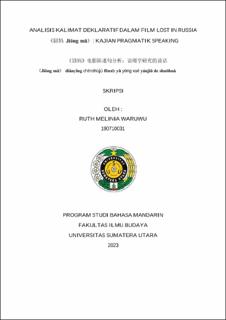Analisis Kalimat Deklaratif dalam Film Lost in Russia《囧妈 Jiǒng mā》: Kajian Pragmatik Speaking 囧妈》电影陈述句分析:语用学研究的说话 《Jiǒng mā》 diànyǐng chénshùjù fēnxī: yǔ yòng xué yánjiū de shuōhuà
Analysis of Declarative Sentences in the Film Lost in Russia :Study Pragmatic Speaking

Date
2023Author
Waruwu, Ruth Melinia
Advisor(s)
Ayuningtias, Niza
Nasution, Vivi Adryani
Metadata
Show full item recordAbstract
The use of declarative sentences is of course widely found in film. Film is a performing art to express ideas, emotions and values to convey messages to audiences. This study aims to describe the types and functions of the use of declarative sentences found in the film “Lost in Russia”. The researcher uses Ramlan and Cao Jianfen's theory about the types of declarative sentences and Zhang Delu's theory about the functions of declarative sentences. Researchers used a qualitative descriptive research method. The data in this study are declarative sentences in the film "Lost in Russia". The researcher used the technique of collecting data by observing and taking notes according to Mahsun, then using the technique of analyzing and presenting data according to Miles and Huberman. The researcher obtained 156 declarative sentences in the movie “Lost in Russia”. The results obtained in this study are that there are 4 types of declarative sentences, namely mood, affirmative, general and double negative, which are divided into particles and adverbs of time. There are 6 functions of declarative sentences, namely explaining, emotional situations, exaggeration, affirmation, dissatisfaction and suggestions. All of the 156 declarative sentence data that are most used are general negative declarative sentences and the expound function.
Collections
- Undergraduate Theses [323]
